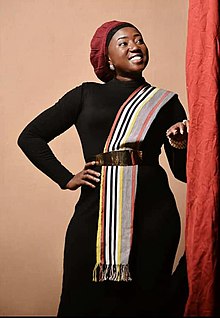Malika Ouattara
Malika Ouattara | |
|---|---|
 | |
| Background information | |
| Also known as | Malika la Slameuse |
| Born | 16 April 1993 Ouagadougou |
| Genres | Slam poetry |
| Occupation | slam artist |
| Instrument | Voice |
Malika Ouattara (born 16 April 1993) is a slam poet and musical artist from Burkina Faso, known as "Malika la Slameuse".
Biography
[edit]Ouattara was born on 16 April 1993 in Ouagadougou in Burkina Faso.[1] She made her performance debut at the Waga Hip Hip Festival in 2009.[2] Her lyrical talent, as well as her presence as a woman on the predominately male slam scene, meant that she became a leading figure in slam in West Africa.[2] In 2017 Outtara estimated that there were only fifteen African women slam poets in total.[3]
She released her first single in 2012, which was part of a project run by the Ministry for Women.[4] In 2013 she made her first television appearances.[4] In 2016 she was photographed by Leila Alaoui, as part of a series focusing on women's empowerment in Burkina Faso.[5] The same year, and postponed by the terrorist attack in which Alaoui was killed, Ouattara released her first album, entitled Slamazone.[4] The album sold more than 5000 copies.[3] Artists who collaborated with Ouattara on it include: Smarty, Greg Burkimbila, Will Be Black and Wendyida.[6] Her music and poetry are socially conscious and feature themes of love, as well as women's rights issues such as unplanned pregnancy.[7] In her single "All Night" she discusses unfaithfulness in relationships.[8] She has won numerous slam awards in West Africa.[9] In June 2015 she took part in a week to raise awareness of issues facing people with albinism in her country.[10]

In 2019 she set up the Slamazone Foundation of which she is President, in order to fund raise for social issues in her country.[11] However the charity had to reprioritise its work in the face of the COVID-19 pandemic; their focus moved to virus prevention through the promotion of good hygiene.[12] In her previous career she worked for the African Institute of Management.[13] On 10 September 2020, Ouattara encouraged as many of her fanclub as possible to donate blood.[14] She also signed a memorandum of understanding between the Slamazone Foundation and the National Blood Transfusion Centre in Ouagadougou.[14]
Outtara is a practising Muslim.[15] She has received criticism from some members of the public who believe that Muslim women should not perform in public.[1] She has publicly stated that her faith and her art do not contradict each other.[15]
References
[edit]- ^ a b "Musique : Zoom sur Malika la Slamazone, Kundé du meilleur artiste féminin 2019 - leFaso.net". lefaso.net (in French). Retrieved 2021-02-23.
- ^ a b "Malika la Slameuse". QG JEUNE (in French). 2018-02-06. Retrieved 2021-02-23.
- ^ a b "Naissance des " slamazones " pour libérer la parole des femmes – Jeune Afrique". JeuneAfrique.com (in French). 2017-12-15. Retrieved 2021-02-23.
- ^ a b c Revelyn (2016-03-27). "Malika la Slameuse : " L'homme qu'il me faut existe "". L'Actualité du Burkina Faso 24h/24 (in French). Retrieved 2021-02-23.
- ^ "The artist who was killed by jihadists - and what she was trying to tell the world". The Independent. 2016-01-22. Retrieved 2021-02-23.
- ^ "Soirée slam avec Elifaz & Malika la slameuse". institutfrancais-burkinafaso.com. Retrieved 2021-02-23.
- ^ "BURKINA FASO: On The Frontline Of The Struggle For Sexual Health And Rights In Burkina Faso". www.mewc.org. Retrieved 2021-02-23.
- ^ cbooth912 (2018-03-08). "Burkina Faso's Malika La Slameuse: "All Night" feat. Stelair". The Hip Hop African. Retrieved 2021-02-23.
{{cite web}}: CS1 maint: numeric names: authors list (link) - ^ Maliweb. "Rencontre avec Malika slameuse : "Le slam c'est bouche qui donne et des oreilles qui prennent" | Maliweb". Retrieved 2021-02-23.
- ^ laguineenne (2019-06-23). "Malika La Slameuse, la reine des mots forts". La Guinéenne (in French). Retrieved 2021-02-23.
- ^ Reid, Caroline (2020-08-12). "International Youth Day 2020". Oxfam Ireland. Retrieved 2021-02-23.
- ^ "Youth and coronavirus in the Sahel: when mutual aid goes viral". Oxfam International (in Spanish). 2020-06-11. Retrieved 2021-02-23.
- ^ "Burkinabè Rising: People in the Film / Les Participants dans le Film | Cultures of Resistance Films". culturesofresistancefilms.com. Retrieved 2021-02-23.
- ^ a b "Don de sang : Malika la Slameuse et ses fans se mobilisent pour sauver des vies - leFaso.net". lefaso.net (in French). Retrieved 2021-02-23.
- ^ a b "Malika la Slameuse : "L'homme qu'il me faut existe"". Burkina 24 Affaires (in French). Retrieved 2021-02-23.
External links
[edit]- Malika La Slameuse - Avortement #BurkinaFaso
- Malika La Slameuse - Moüslimine
